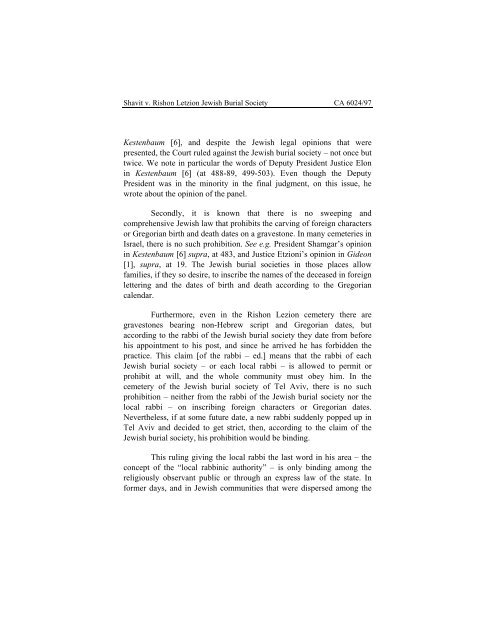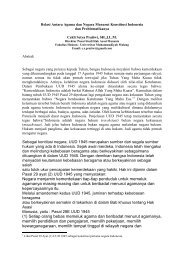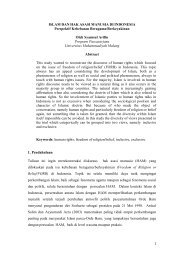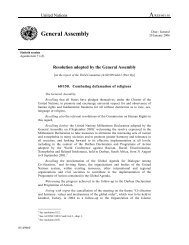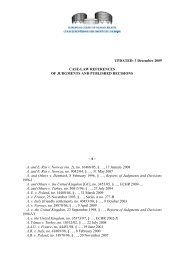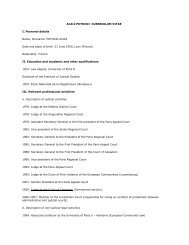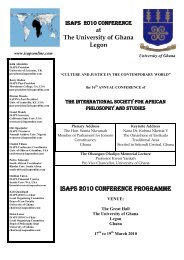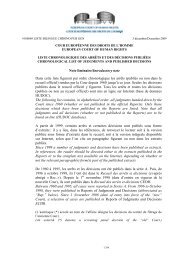Fredrika Shavit v. Rishon Lezion Jewish Burial Society
Fredrika Shavit v. Rishon Lezion Jewish Burial Society
Fredrika Shavit v. Rishon Lezion Jewish Burial Society
Create successful ePaper yourself
Turn your PDF publications into a flip-book with our unique Google optimized e-Paper software.
<strong>Shavit</strong> v. <strong>Rishon</strong> Letzion <strong>Jewish</strong> <strong>Burial</strong> <strong>Society</strong><br />
CA 6024/97<br />
Kestenbaum [6], and despite the <strong>Jewish</strong> legal opinions that were<br />
presented, the Court ruled against the <strong>Jewish</strong> burial society – not once but<br />
twice. We note in particular the words of Deputy President Justice Elon<br />
in Kestenbaum [6] (at 488-89, 499-503). Even though the Deputy<br />
President was in the minority in the final judgment, on this issue, he<br />
wrote about the opinion of the panel.<br />
Secondly, it is known that there is no sweeping and<br />
comprehensive <strong>Jewish</strong> law that prohibits the carving of foreign characters<br />
or Gregorian birth and death dates on a gravestone. In many cemeteries in<br />
Israel, there is no such prohibition. See e.g. President Shamgar’s opinion<br />
in Kestenbaum [6] supra, at 483, and Justice Etzioni’s opinion in Gideon<br />
[1], supra, at 19. The <strong>Jewish</strong> burial societies in those places allow<br />
families, if they so desire, to inscribe the names of the deceased in foreign<br />
lettering and the dates of birth and death according to the Gregorian<br />
calendar.<br />
Furthermore, even in the <strong>Rishon</strong> <strong>Lezion</strong> cemetery there are<br />
gravestones bearing non-Hebrew script and Gregorian dates, but<br />
according to the rabbi of the <strong>Jewish</strong> burial society they date from before<br />
his appointment to his post, and since he arrived he has forbidden the<br />
practice. This claim [of the rabbi – ed.] means that the rabbi of each<br />
<strong>Jewish</strong> burial society – or each local rabbi – is allowed to permit or<br />
prohibit at will, and the whole community must obey him. In the<br />
cemetery of the <strong>Jewish</strong> burial society of Tel Aviv, there is no such<br />
prohibition – neither from the rabbi of the <strong>Jewish</strong> burial society nor the<br />
local rabbi – on inscribing foreign characters or Gregorian dates.<br />
Nevertheless, if at some future date, a new rabbi suddenly popped up in<br />
Tel Aviv and decided to get strict, then, according to the claim of the<br />
<strong>Jewish</strong> burial society, his prohibition would be binding.<br />
This ruling giving the local rabbi the last word in his area – the<br />
concept of the “local rabbinic authority” – is only binding among the<br />
religiously observant public or through an express law of the state. In<br />
former days, and in <strong>Jewish</strong> communities that were dispersed among the


